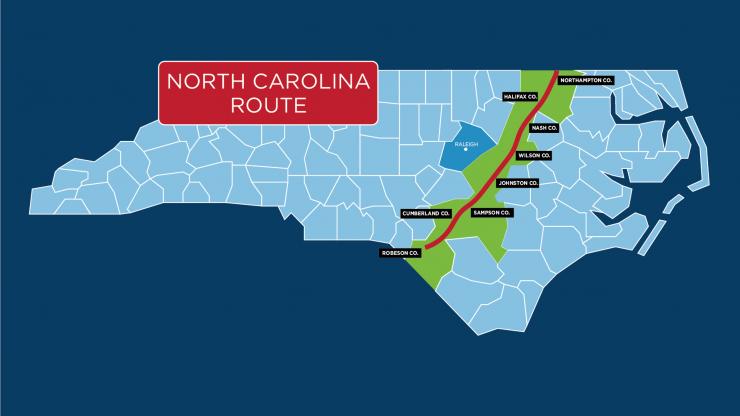
Updated to include statement from the governor, NCDEQ
Duke Energy and Dominion Energy are no longer pursuing the Atlantic Coast Pipeline, a project that faced fierce opposition since first being announced in 2014.
Supporter Spotlight
The companies in a joint press release Sunday said the decision was made not to pursue the project because of continued delays, litigation and climbing cost. The project’s federal and state permits faced several legal challenges, causing the project to be delayed and to increase to $8 billion from the original estimate of $4.5 to $5 billion.
The project would have placed nearly 600 miles of underground pipeline from West Virginia, through Virginia and ending in eastern North Carolina near the South Carolina border. Of those 600 miles, 186 would have been through Northampton, Halifax, Nash, Wilson, Johnston, Sampson, Cumberland and Robeson counties, according to the state Department of Environmental Quality.
Thomas F. Farrell II, Dominion Energy chairman, president and chief executive officer, and Lynn J. Good, Duke Energy chair, president and chief executive officer, said in the release that they regret being unable to complete the Atlantic Coast Pipeline that has been underway for nearly six years.
“This announcement reflects the increasing legal uncertainty that overhangs large-scale energy and industrial infrastructure development in the United States. Until these issues are resolved, the ability to satisfy the country’s energy needs will be significantly challenged,” the joint statement said.
State Department of Environmental Quality Secretary Michael Regan told Coastal Review Online Wednesday that the decision to cancel the Atlantic Coast Pipeline project is pivotal, closing the final chapters on fossil fuel investments in North Carolina.
Supporter Spotlight
“Now, we should focus on clean energy solutions that protect the environment and all North Carolinians, while creating thousands of jobs and boosting economies statewide. Implementing North Carolina’s Clean Energy Plan propels our state’s global competitiveness, cementing our leadership in the future of clean energy,” he said.
Gov. Roy Cooper said in a statement Sunday after the Atlantic Coast Pipeline owners announced the project was canceled that “This decision and the changing energy landscape should lead to cleaner and more reliable energy generation in North Carolina. Our Clean Energy Plan provides an excellent framework and stakeholder process for renewable energy moving forward.”
The Southern Environmental Law Center, or SELC, in a statement Sunday following the announcement that the project has been canceled states that a number of needed permits remained missing following legal defeats.
“This is a victory for all the communities that were in the path of this risky and unnecessary project. The Atlantic Coast Pipeline was ill-conceived from the start. After years of opposition, legal defeats, and threats to the environment, SELC is relieved to see Duke and Dominion make the right decision to walk away from it,” said Senior Attorney Greg Buppert, who leads SELC’s Atlantic Coast Pipeline team. “This is a great day for the people of Union Hill, for public lands, for landowners in the path, and for all North Carolinians and Virginians, who deserve a clean energy future and are no longer on the hook to pay for this $8 billion pipeline.”
SELC has represented during the last six years a group of conservation organizations opposed to the pipeline, including Alliance of the Shenandoah Valley, Cowpasture River Preservation Association, Defenders of Wildlife, Friend of Buckingham, Friends of Nelson, Jackson River Preservation Association, Highlanders for Responsible Development, Piedmont Environmental Council, Potomac Riverkeeper Inc., Shenandoah Riverkeeper, Shenandoah Valley Battlefields Foundation, Sierra Club, Sound Rivers, Inc., Virginia Wilderness Committee and Winyah Rivers Foundation.
“Today’s outcome would not be possible without their energy and commitment, as well as many others throughout Virginia and North Carolina who have fought for this day,” said Buppert.
The project raised concerns about environmental justice, which SELC addressed as well.
The Federal Energy Regulatory Commission, or FERC, found that more than half of the census tracts within a mile of the the project have disproportionately high populations of people either living below the poverty line or belonging to racial or ethnic minorities, including members of the Lumbee Indian Tribe in Robeson County but did not other environmental justice communities close to the pipeline, including the historic African-American community in Union Hill, Virginia, according to the SELC.







